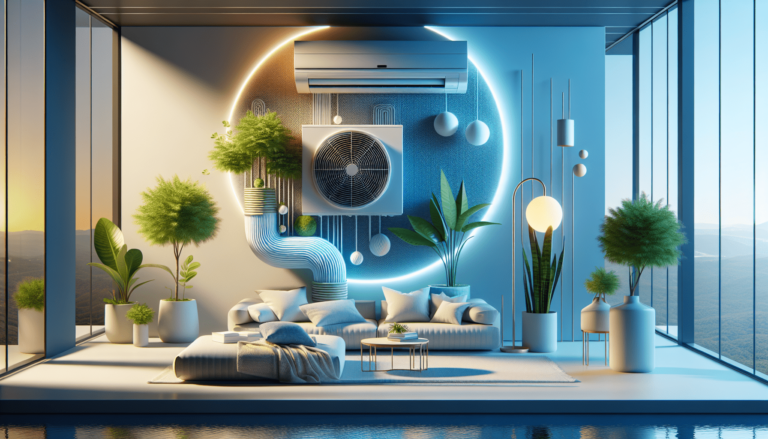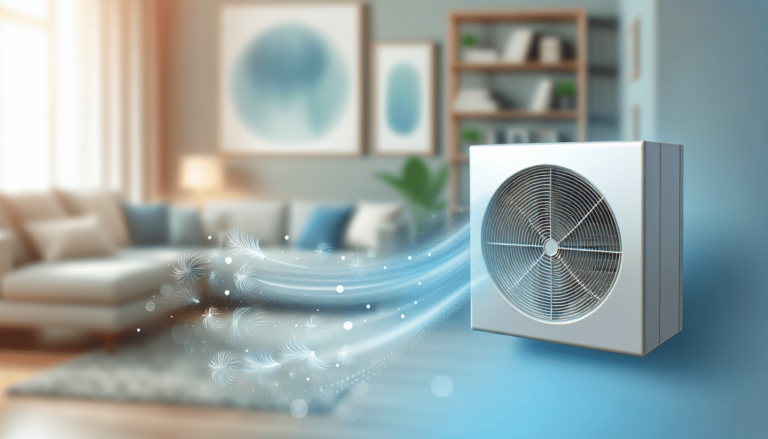

HVAC Services
Get Professional Repairs From The Area's Trusted HVAC Technicians. Ask About Our Services! We Offer Professional Heating & Cooling System Repairs And Guarantee Long-Lasting Results.
Got Question? Call us: (850) 678-2665Financing
The Impact of HVAC on Health and Well-being
Discover how HVAC systems impact your health and well-being. Learn about indoor air quality, temperature control, respiratory health, allergies, sleep quality, and mental well-being in this informative article. Find out how Tempacure Heating and Air Conditioning can optimize your HVAC system for a healthier living environment.
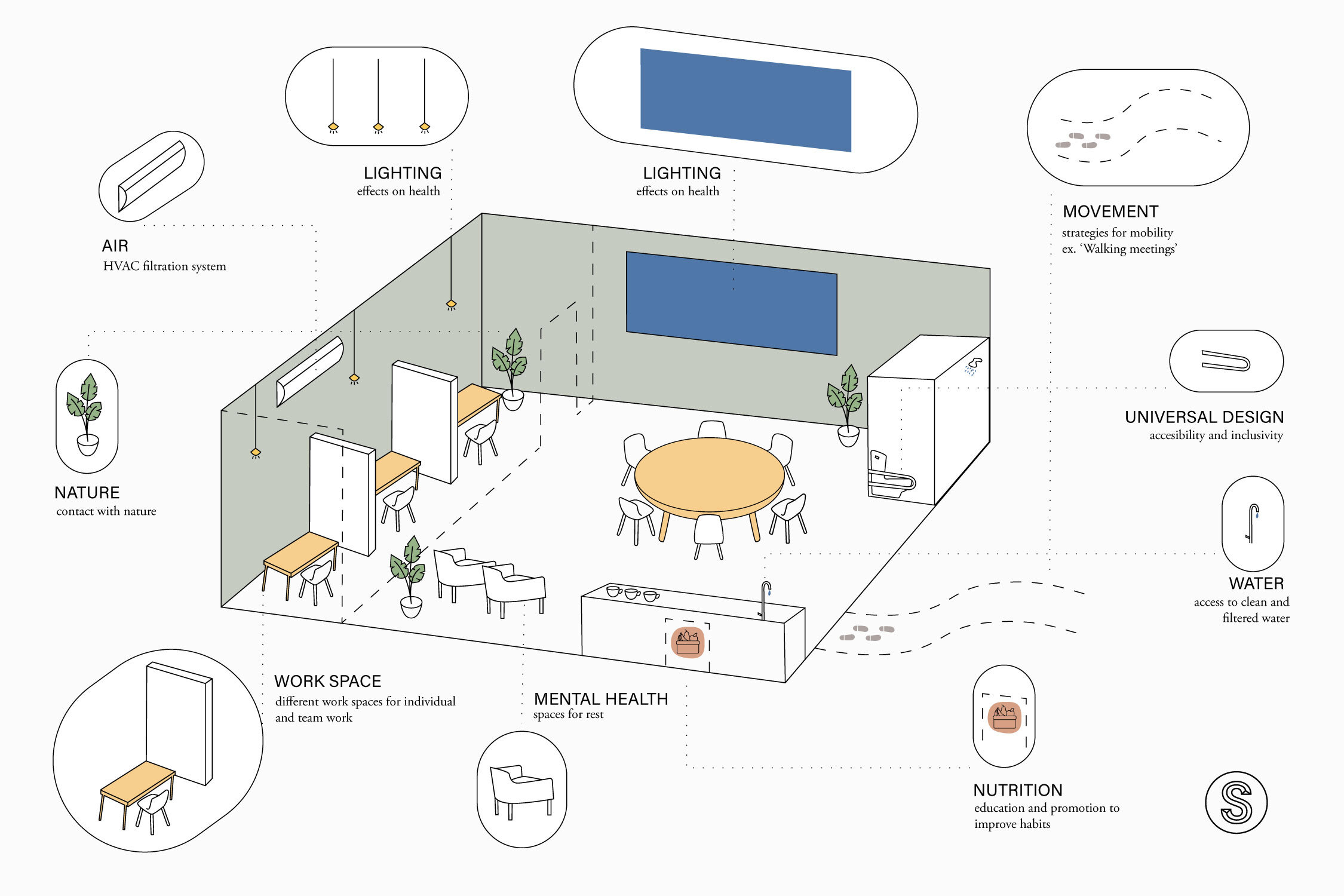
Did you know that your HVAC system plays a vital role in your health and well-being? Temperature control, ventilation, and air quality all have a significant impact on your overall comfort and physical wellness. With the right HVAC system in place, you can create a comfortable living environment that promotes better sleep, increases productivity, and reduces the risk of respiratory issues. In this article, we will explore the different ways in which HVAC systems affect your health and well-being, and how Tempacure Heating and Air Conditioning, the leader in HVAC services in Niceville FL, can help ensure that your HVAC system is optimized for your well-being.
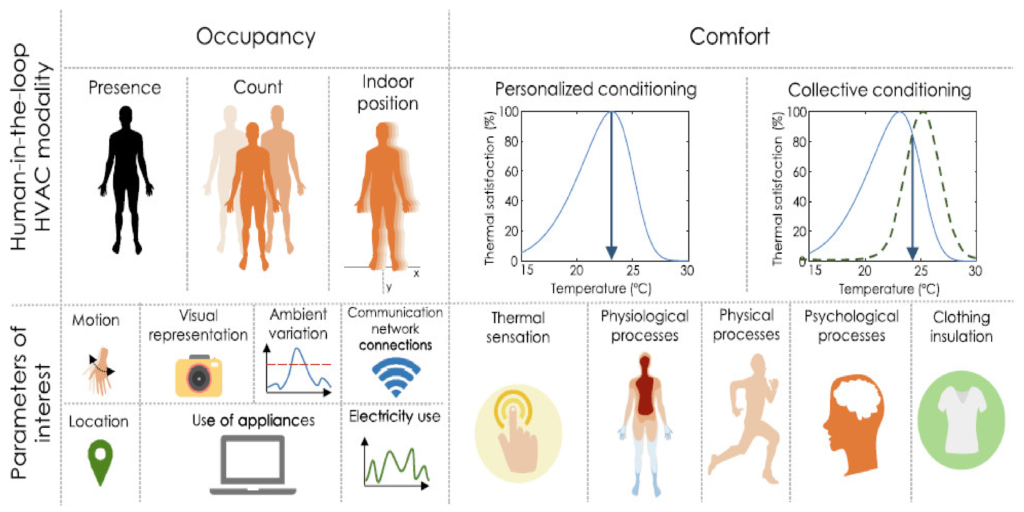
This image is property of www.mdpi.com.
How HVAC systems affect indoor air quality
Introduction to indoor air quality (IAQ)
When it comes to maintaining a healthy indoor environment, one key factor to consider is the quality of the air you breathe. Indoor air quality (IAQ) refers to the condition of the air inside a building or enclosed space, and it plays a crucial role in your overall health and well-being.
Common pollutants found in indoor air
Indoor air can be contaminated with a variety of pollutants, including dust, pollen, pet dander, mold spores, volatile organic compounds (VOCs), and even bacteria and viruses. These pollutants can originate from various sources such as outdoor air, building materials, cleaning products, and everyday activities like cooking and smoking.
Effect of HVAC systems on IAQ
Your HVAC system, which stands for heating, ventilation, and air conditioning, plays a significant role in influencing the indoor air quality of your space. HVAC systems are responsible for circulating and filtering the air, thereby removing pollutants and maintaining a clean and healthy environment.
Filters and their role in maintaining IAQ
One of the vital components of an HVAC system that contributes to maintaining good indoor air quality is the air filter. Filters help capture and trap airborne particles, preventing them from circulating in the indoor air. These filters come in various types, such as mechanical filters, electronic filters, and HEPA filters, each with different efficiency levels in capturing different types and sizes of pollutants.
Importance of regular maintenance and cleaning
To ensure the optimal functioning of your HVAC system and to maintain good indoor air quality, regular maintenance and cleaning are essential. Dust, debris, and other contaminants can accumulate in the system over time, reducing its efficiency and potentially compromising indoor air quality. Regular inspections, filter replacements, and system cleanings are necessary to keep your HVAC system running smoothly and to promote a healthy environment.
The role of HVAC in maintaining temperature and humidity
Understanding thermal comfort
Thermal comfort refers to the state of mind that expresses satisfaction with the surrounding environment’s thermal conditions. Achieving thermal comfort involves finding the optimal balance between temperature, humidity, air movement, and personal preferences.
The impact of temperature on health and well-being
Temperature plays a significant role in our health and well-being. Extremes in temperature can lead to discomfort, fatigue, and even severe health issues. Cold temperatures can cause hypothermia and increase the risk of respiratory problems, while excessive heat can lead to heatstroke and dehydration.
The role of HVAC systems in temperature control
HVAC systems are designed to regulate temperature and provide a comfortable indoor environment. They can both cool and heat spaces, ensuring that the temperature remains within a desirable range all year round. Through proper insulation, airflow control, and effective temperature regulation, HVAC systems help maintain a comfortable and healthy living or working environment.
The importance of maintaining appropriate humidity levels
Alongside temperature, humidity levels also play a crucial role in maintaining a comfortable indoor environment. High humidity levels can lead to mold growth, musty odors, and discomfort, while low humidity levels can cause dry skin, irritated respiratory passages, and static electricity. Proper humidity control is essential for both comfort and overall health.
Effects of high and low humidity on health
High humidity levels can create an ideal breeding ground for mold, bacteria, and dust mites, which can trigger allergies and respiratory problems. On the other hand, low humidity can cause dryness and irritation of the skin, eyes, and respiratory tract. Additionally, low humidity can increase the risk of respiratory infections and worsen the symptoms of asthma and allergies.
HVAC systems and respiratory health
How HVAC systems impact respiratory conditions
Having a well-functioning HVAC system is crucial for individuals with respiratory conditions such as asthma or allergies. HVAC systems help remove allergens, pollutants, and irritants from the air, reducing the risk of respiratory triggers and improving overall respiratory health.
Controlling allergens with proper ventilation
Effective ventilation is essential for controlling allergens and maintaining good indoor air quality. Properly designed HVAC systems ensure that fresh outdoor air is continuously brought in and stale indoor air is exhausted, reducing the concentration of allergens and promoting a healthier breathing environment.
The role of HVAC in reducing airborne diseases
In addition to allergens, HVAC systems also play a vital role in reducing the transmission of airborne diseases. Properly filtered and ventilated air can help remove infectious particles, such as bacteria and viruses, from the indoor environment, reducing the risk of respiratory infections.
Effects of poor ventilation on respiratory health
Insufficient ventilation can lead to the buildup of pollutants and contaminants indoors, including carbon dioxide, formaldehyde, and volatile organic compounds (VOCs). Breathing in these pollutants can cause respiratory irritation, exacerbate existing respiratory conditions, and contribute to the development of respiratory diseases over time.
Benefits of air purification systems
To further enhance respiratory health, air purification systems can be integrated into HVAC systems. These systems utilize advanced filtration technologies, such as UV germicidal lights and activated carbon filters, to effectively reduce pollutants, allergens, and pathogens in the air. Air purification systems can significantly improve indoor air quality, particularly for individuals with respiratory conditions.
HVAC and allergies
Understanding the impact of HVAC on allergies
Allergies are a common health concern, and the indoor environment can harbor numerous allergens that trigger allergic reactions. HVAC systems, with their ability to filter and circulate air, can play a significant role in reducing allergens and creating an allergy-friendly environment.
Common allergens found in indoor air
Indoor air can contain various allergens, including dust mites, pollen, pet dander, mold spores, and cockroach allergens. Breathing in these allergens can cause allergic reactions, ranging from mild symptoms such as sneezing and itchy eyes to more severe reactions like asthma attacks.
Methods to reduce allergens through HVAC systems
HVAC systems can effectively reduce allergens by using high-efficiency air filters that capture and remove allergenic particles from the air. Regular filter replacements and proper maintenance are necessary to ensure the filters’ efficiency in trapping allergens and preventing their re-circulation.
Importance of air filtration and purification
In addition to regular air filters, HVAC systems can be equipped with specialized air filtration and purification systems. These systems use advanced technologies like HEPA filters and activated carbon to trap and remove even the smallest allergenic particles, helping to alleviate allergy symptoms and create an allergen-free environment.
Effect of HVAC maintenance on allergy prevention
Proper HVAC maintenance, including regular inspections and cleanings, is crucial for allergy prevention. Neglecting maintenance can lead to the accumulation of dust, pollen, and other allergens within the system, potentially worsening allergy symptoms instead of alleviating them. By prioritizing HVAC maintenance, you can ensure an allergy-friendly indoor environment.

This image is property of teamhardingcomfort.com.
The impact of HVAC on sleep quality
Role of temperature in sleep regulation
Temperature plays a vital role in regulating sleep patterns. The body’s core temperature naturally decreases during the night to promote sleep, and a comfortable sleep environment can enhance this natural process, leading to better sleep quality.
Optimal temperature for better sleep
Research suggests that the optimal temperature range for promoting quality sleep is between 60°F (15.5°C) and 67°F (19.5°C). Maintaining a cooler temperature within this range helps facilitate falling asleep faster and promotes uninterrupted sleep throughout the night.
Using HVAC systems to promote quality sleep
HVAC systems equipped with programmable thermostats allow for precise temperature control, making it easier to create an ideal sleep environment. By setting the temperature to a cool and comfortable level before bedtime, you can facilitate a peaceful night’s sleep.
Effects of poor temperature control on sleep
Sleeping in an environment with inadequate temperature control can negatively impact sleep quality. High temperatures can lead to discomfort, excessive sweating, and restlessness, while low temperatures can cause shivering and disrupted sleep. Having a well-maintained HVAC system is essential for maintaining optimal sleep conditions.
The importance of noise reduction in HVAC systems
In addition to temperature control, HVAC systems should also prioritize noise reduction for a restful sleep. Noisy HVAC systems can disrupt sleep and lead to poor sleep quality. Regular maintenance and inspections help ensure that HVAC systems operate quietly, allowing for an undisturbed sleep experience.
HVAC systems and mental well-being
The connection between HVAC and mental health
The indoor environment, including temperature, humidity, and air quality, has an impact on our mental well-being. A comfortable and healthy environment created by HVAC systems can positively contribute to mood, productivity, and overall mental health.
Effects of temperature on mood and productivity
Temperature can influence mood and productivity levels. Extreme temperatures, whether too hot or too cold, can lead to discomfort, irritability, and difficulty concentrating. Maintaining a comfortable temperature through HVAC systems promotes a positive and productive environment.
Creating a comfortable environment through HVAC
HVAC systems provide the means to create a comfortable indoor environment tailored to individual preferences. By allowing precise temperature control and maintaining optimal humidity levels, HVAC systems contribute to a pleasant atmosphere that enhances mental well-being.
Role of HVAC in reducing stress and anxiety
A comfortable and well-regulated indoor environment can help reduce stress and anxiety. HVAC systems that effectively control temperature and humidity create a calming and relaxing atmosphere, positively impacting mental health and promoting a sense of well-being.
Improving cognitive performance with proper HVAC
Research has shown that maintaining a comfortable indoor environment through HVAC systems can improve cognitive performance. Optimal temperature, humidity, and air quality promote alertness, concentration, and cognitive function, supporting mental clarity and productivity.
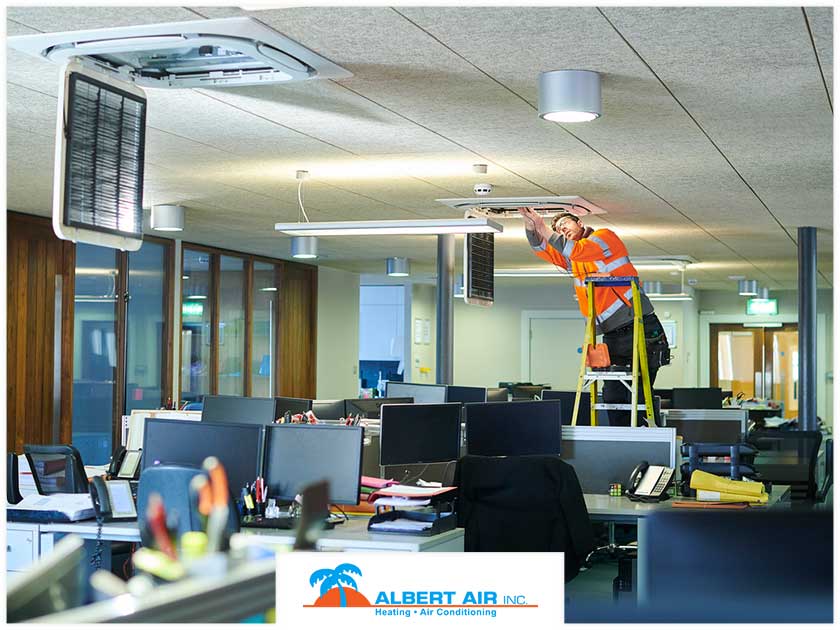
This image is property of www.albertair.com.
HVAC and the spread of airborne diseases
Understanding how HVAC systems can contribute to disease transmission
HVAC systems have the potential to facilitate the spread of airborne diseases if not properly designed, maintained, and operated. Improper ventilation, insufficient air filtration, and inadequate disinfection measures can allow pathogens to circulate and contaminate the indoor environment.
Importance of ventilation in preventing airborne disease spread
Proper ventilation is crucial in reducing the risk of airborne disease transmission. Well-designed HVAC systems provide adequate ventilation, ensuring a continuous supply of fresh outdoor air while removing stale indoor air. This dilutes and removes potentially infectious particles, minimizing the spread of diseases.
Using air filters and UV germicidal lights for disease control
Air filters and UV germicidal lights integrated into HVAC systems can significantly contribute to disease control. High-efficiency air filters can capture and remove airborne pathogens, while UV germicidal lights utilize ultraviolet radiation to inactivate viruses, bacteria, and other microorganisms, preventing their transmission.
Considerations for HVAC system design in healthcare facilities
In healthcare facilities, HVAC systems play a critical role in infection control. Properly designed systems should consider factors such as air pressure differentials, isolation room ventilation, and air exhaust systems to effectively prevent the spread of diseases and protect both patients and healthcare workers.
The impact of HVAC on pandemic preparedness
The ongoing COVID-19 pandemic has highlighted the importance of HVAC systems in pandemic preparedness. HVAC systems that incorporate advanced air filtration, UV germicidal lights, and proper ventilation can help reduce the transmission of airborne viruses and play a significant role in ensuring a safer indoor environment during future pandemics.
Effects of poor HVAC maintenance on health
Consequences of neglecting HVAC system maintenance
Neglecting HVAC system maintenance can have several adverse effects on health. The system’s performance may decline, leading to inadequate temperature control, poor indoor air quality, and increased energy consumption. This can compromise both physical and mental well-being.
Health risks associated with dirty or malfunctioning HVAC systems
A poorly maintained HVAC system can become a breeding ground for bacteria, mold, and other contaminants. These can be released into the indoor air and cause or worsen respiratory issues, allergies, and other health problems. Additionally, a malfunctioning system can lead to temperature extremes that negatively impact health and comfort.
Importance of regular inspections and cleaning
Regular inspections and cleanings are essential for identifying and addressing any potential issues with the HVAC system. By detecting and resolving problems early on, you can prevent their impact on indoor air quality and overall health. Additionally, cleaning components like air ducts, coils, and condensate pans removes accumulated dirt and contaminants, ensuring optimal system performance.
Addressing mold and other potential health hazards
Mold growth within HVAC systems is a significant health concern. Mold spores can be released into the air, leading to allergies, respiratory irritation, and other health issues. Proper maintenance, including humidity control, regular inspections, and prompt repairs, helps prevent and address mold growth, ensuring a healthy indoor environment.
The role of professional HVAC services in maintaining health
To ensure optimal HVAC system performance and maintain good health, it is crucial to rely on professional HVAC services. Certified technicians can provide regular inspections, cleanings, maintenance, and repairs to address any issues and keep the system operating at its best. Professional services also ensure compliance with safety standards and help prolong the life of the HVAC system.
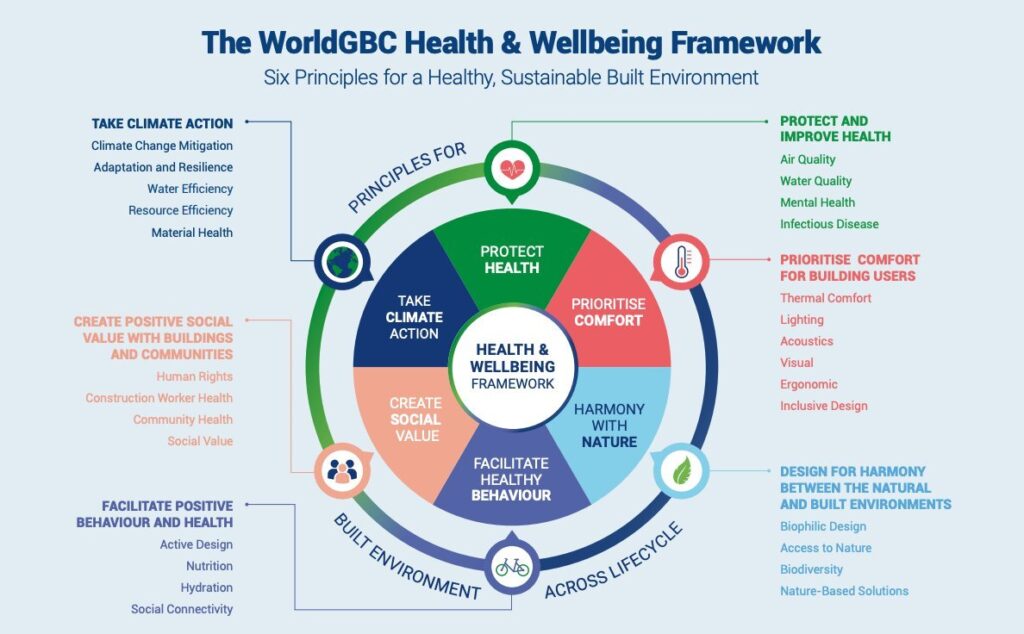
This image is property of images.squarespace-cdn.com.
Energy efficiency and its impact on health
The environmental and health benefits of energy-efficient HVAC systems
Energy-efficient HVAC systems not only reduce energy consumption, but they also have positive environmental and health impacts. By minimizing greenhouse gas emissions and reducing reliance on fossil fuels, energy-efficient systems help combat climate change and improve air quality.
Reducing carbon footprint and improving air quality
Conventional HVAC systems consume significant amounts of energy, contributing to carbon emissions and air pollution. Energy-efficient systems, which employ advanced technologies and design strategies to optimize energy usage, help reduce the carbon footprint and promote cleaner air, thereby benefiting human health.
The impact of energy-efficient upgrades on respiratory health
Energy-efficient upgrades, such as improved insulation, advanced air sealing, and efficient HVAC equipment, contribute to better indoor air quality and respiratory health. These upgrades prevent the infiltration of outdoor pollutants, enhance temperature and humidity control, and reduce the risk of respiratory issues and allergies.
Examples of energy-saving HVAC technologies
Various energy-saving HVAC technologies are available to improve efficiency and reduce energy consumption. Examples include variable-speed motors, high-efficiency heat pumps, smart thermostats, and energy recovery ventilation systems. Adopting these technologies can significantly improve both energy efficiency and overall health.
Promoting sustainability and well-being through efficient HVAC
By embracing energy-efficient HVAC systems, individuals and organizations can promote sustainability and well-being. Reduced energy consumption leads to cost savings, while improved air quality and comfort create healthier and more productive indoor environments. Energy efficiency and health go hand in hand, creating a win-win situation for both individuals and the environment.
The future of HVAC and health
Emerging technologies for improved indoor air quality
Continual advancements in HVAC technologies are paving the way for improved indoor air quality. Innovations such as better filtration systems, smart sensors, and real-time air quality monitoring offer promising solutions for ensuring healthier indoor environments.
Smart HVAC systems and their health benefits
Smart HVAC systems, integrated with smart technologies and sensors, are revolutionizing indoor comfort and air quality. These systems can automatically adjust temperature, humidity, and air purification according to individual preferences and real-time conditions, promoting personalized well-being.
Integration of IoT in HVAC for personalized well-being
The Internet of Things (IoT) is playing a significant role in the integration of HVAC systems with other smart devices. By utilizing IoT capabilities, HVAC systems can interact with wearable devices, provide personalized recommendations, and optimize indoor environments based on the user’s specific health and comfort needs.
Advancements in air filtration and purification
Technological advancements are continually improving air filtration and purification systems used in HVAC. New techniques and materials, such as electrostatic filtration, photocatalytic oxidation, and nanotechnology-based filters, offer enhanced efficiency in capturing and eliminating pollutants, allergens, and pathogens from the air.
Potential impact of HVAC on future healthcare
The role of HVAC systems in healthcare facilities will continue to evolve, with increasing emphasis on infection control and patient well-being. Innovations in HVAC design, ventilation strategies, and air disinfection technologies will shape the future of healthcare environments, ensuring the safety and comfort of both patients and medical personnel.
In conclusion, HVAC systems have a profound impact on health and well-being. From maintaining indoor air quality and temperature control to reducing the spread of airborne diseases and promoting quality sleep, HVAC systems play a vital role in creating a healthy and comfortable indoor environment. Regular maintenance, proper ventilation, effective filtration, and energy-efficient technologies are key factors in optimizing the health benefits provided by HVAC systems. By recognizing and prioritizing the importance of HVAC in promoting health, individuals and organizations can take proactive steps towards creating a safer, healthier, and more comfortable living and working environment.
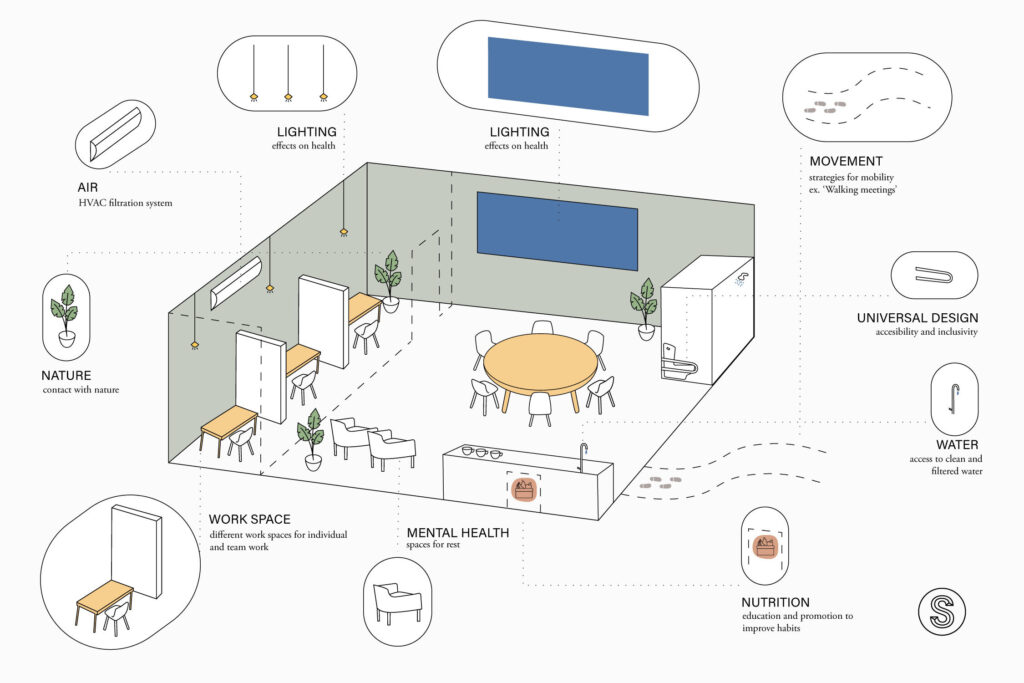
This image is property of images.squarespace-cdn.com.


